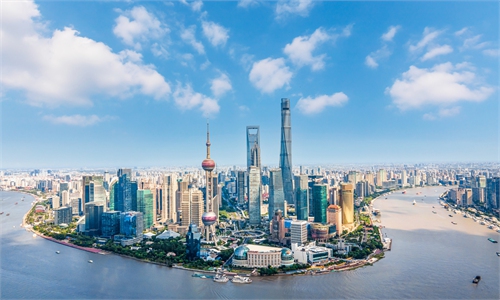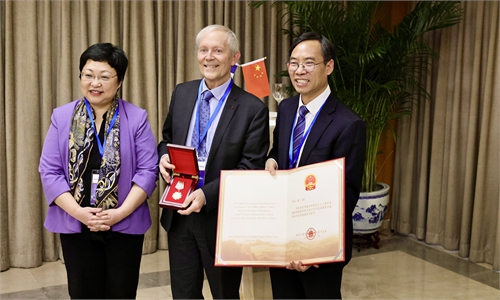IN-DEPTH / IN-DEPTH
China’s Gen Z bridges heritage and innovation on global stage with confidence, responsibility
Editor's Note:
The youth are the vanguards of our time, showcasing boundless energy and vibrant personalities.
Gen Zers not only represent the makers of the future but also serve as agents of change in the present. With an open mindset and an international outlook, they actively integrate into the currents of globalization, engaging in deep exchanges, and collaborating with youth from around the world to explore pathways and strategies to address global challenges.
The Global Times has launched the "Voice from Gen Z" series, which focuses on the proactive actions and innovative achievements of young people in areas such as global governance, cultural exchange, environmental protection, and technological innovation. Through this series, we aim to showcase the unique charm and future leadership of global Gen Zers.
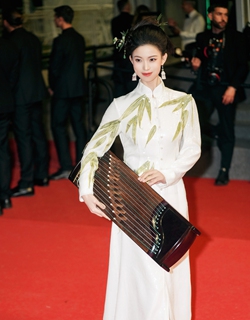
May 4, 2025 marked China's Youth Day, commemorating the historic May Fourth Movement of 1919, a monumental youth movement that ignited profound social changes in China. As the movement commemorates its 106th anniversary, a look back at that pivotal awakening reveals a heartening truth: Today's Chinese youth are redefining the spirit of their forebears with fresh vigor and global relevance.
Amid profound shifts in the world order and the restructuring of global governance, China's new generation is scripting a modern narrative of the May Fourth spirit - armed with cultural confidence, professional excellence, and an international vision. Some don traditional Chinese attire, bringing Eastern melodies to global stages; others dedicate themselves to international agricultural projects, leveraging cross-cultural communication skills and local expertise to adapt China's development experience for Africa's fertile soil. Still others step from UN podiums into the public limelight, using their cameras to document China's engagement with the world.
These young pioneers embody the spirit of China's new generation - a living testament to the country's wisdom and sense of responsibility. Through them, the world sees a China that is credible, endearing, and worthy of respect.
Bridging worlds with Chinese culture
At the 77th Cannes Film Festival in France, a Chinese young woman dressed in Hanfu, the traditional Chinese clothing, and carrying a guzheng - a plucked-string musical instrument with a 2,500-year history - drew rapt attention. With poised grace, Peng Jingxuan, a Gen Zer Chinese student in France, performed "Mulan," a piece inspired by the legendary female warrior, as applause rippled around her. The music wove together the heroic spirit of a heroine and the tender longing of a wanderer, flowing through her nimble fingers into the hearts of onlookers.
This is not the first time Peng has turned heads globally. Known online as "Pengpeng" to her 1.03 million YouTube followers, Peng, born in Central China's Hunan Province, has used her guzheng to bridge cultures - from bustling street corners to prestigious international art festivals. Every seven to ten days, she carries her instrument to the streets of France, dressing in Hanfu, alternating between playing classic Chinese pieces like "Evening Song of a Drunken Fisherman" and "High Mountains and Flowing Water," and guzheng-adapted versions of Western songs such as "See You Again" and "Rolling in the Deep." This musical blend - familiar yet novel - resonates deeply with passersby on French streets, often drawing applause and curiosity-fueled conversations.
"Every street show is a 'Chinese cultural showcase' to me," Peng told the Global Times. She retains the core melody of her pieces but infuses guzheng-specific techniques like string-bending and rapid finger-rocking. Passersby often stop to ask about her instrument, sparking conversations about China - moments she treasures as cultural exchanges.
To deepen these interactions, Peng now carries a small sign with English and French explanations of the guzheng, along with panda-themed souvenirs, to share China's heritage more vividly. These encounters have strengthened her mission: "Connecting the world through Chinese culture." Over the past seven years, she has brought her guzheng to more than a dozen international cities, from Paris to Milan, weaving Chinese narratives into every note.
"After my performance at the Cannes Film Festival, journalists and the renowned pianist Lang Lang told me that my piece was 'wonderful,'" Peng recalled to the Global Times. "It felt incredible because music truly transcends language. It touches people's souls."
For her, while music knows no borders, musicians carry cultural DNA. She experiments with blending guzheng into foreign pop, rock, and electronic music, but insists, "No matter the melody, the rhythm, phrasing, and emotions rooted in my culture are my signature as a Chinese musician."
Looking ahead, Peng dreams of taking her guzheng to more Belt and Road Initiative (BRI) partner countries. "I want to use Chinese music as a universal language, so the world can better understand China - one string at a time."
Nurturing professionals combating poverty
At the headquarters of the International Fund for Agricultural Development (IFAD) in Rome, Italy, Chen Zeyu, a young Chinese professional, works intensively with his team to finalize the design of the "DeSIRA+" agricultural research project. This project is dedicated to protecting indigenous crop varieties and enhancing the resilience of food security in African countries. As the only member of the team familiar with the development paths of both China and Africa, this young man from Shenzhen, South China's Guangdong Province, is serving as a bridge for dialogue among diverse civilizations and development experiences.
Chen's connection with Africa began three years ago. In 2022, Chen was granted the qualification for a government-sponsored study abroad program and went to the School of Oriental and African Studies at the University of London for further education. There, he started to consider how his research could help the millions of people in sub-Saharan Africa who are facing extreme hunger.
"I needed to translate research into tangible solutions," he told the Global Times.
His breakthrough came during a 2023 internship at the Paris headquarters of the Organisation for Economic Co-operation and Development (OECD), where the interactive map of food security in West Africa, which he led the development of, has become a decision-making reference for the agricultural departments of many countries. Later, he interned and worked at international platforms such as the United Nations Development Programme (UNDP) and the IFAD, exploring how Chinese experiences could be deeply integrated with the realities in Africa.
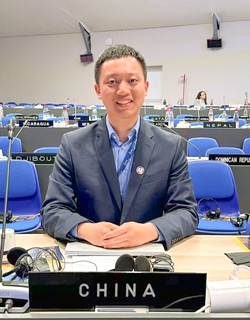
During these field experiences, Chen keenly observed a fundamental divergence in development philosophies: While Western aid programs often prioritize policy capacity-building, China's approach emphasizes practical, measurable outcomes.
"China's technical assistance focuses on concrete metrics - like boosting crop yields - and rigorously evaluating what works," Chen explained. "It's not about handing out fish, but teaching how to fish sustainably."
At the IFAD, he introduced the experience of cultural heritage protection in Chinese agriculture into the project design, helping African farmers leverage traditional knowledge to protect indigenous crops while balancing high-yield varieties with biodiversity - an approach that earned praise from both project advisers and African government delegates.
"Now, at the IFAD, more and more colleagues from different departments like to visit the office of the China-IFAD South-South and Triangular Cooperation Facility to learn about various details of the 'Chinese solutions,'" said Chen.
When talking about the role played by the Chinese youth in international organizations, Chen's eyes lit up: "We are not just onlookers." In his opinion, an advantage of his generation is that they understand both the realities of China and international rules.
"My foreign colleagues said that each year, the new Chinese youths who arrive there bring with them new surprises," said this young man who is about to pursue a PhD in political science at Tsinghua University. He also plans to conduct on-site research in Africa.
"I want to see with my own eyes what the Chinese sorghum seeds look like when they grow in the fields of Africa," Chen said.
Building a better world
When people think of the UN, many envision sharply dressed diplomats at the organization's New York headquarters. But for Xiao Q (pseudonym), a Gen-Z Chinese man, his first two years working in the UN system involved neither suits nor skyscrapers. Instead, his office was often out in the fields.
The Centre for Sustainable Agricultural Mechanization under the UN, formerly known as the UN Asian and Pacific Centre for Agricultural Engineering and Machinery, was the first official UN body headquartered in China. After graduating from university in 2018, Xiao Q began his journey at this center, where he was primarily responsible for developing agricultural machinery testing standards across the Asia-Pacific region.
"Tractors, harvesters, seeders - I spent most of my time in the fields working with different types of agricultural machinery. It gave me a whole new perspective on the UN," Xiao Q said.
While at the center, he also helped organize a series of agriculture-focused training programs for countries across Asia, which gave him a firsthand understanding of China's role and unique contributions to global development.
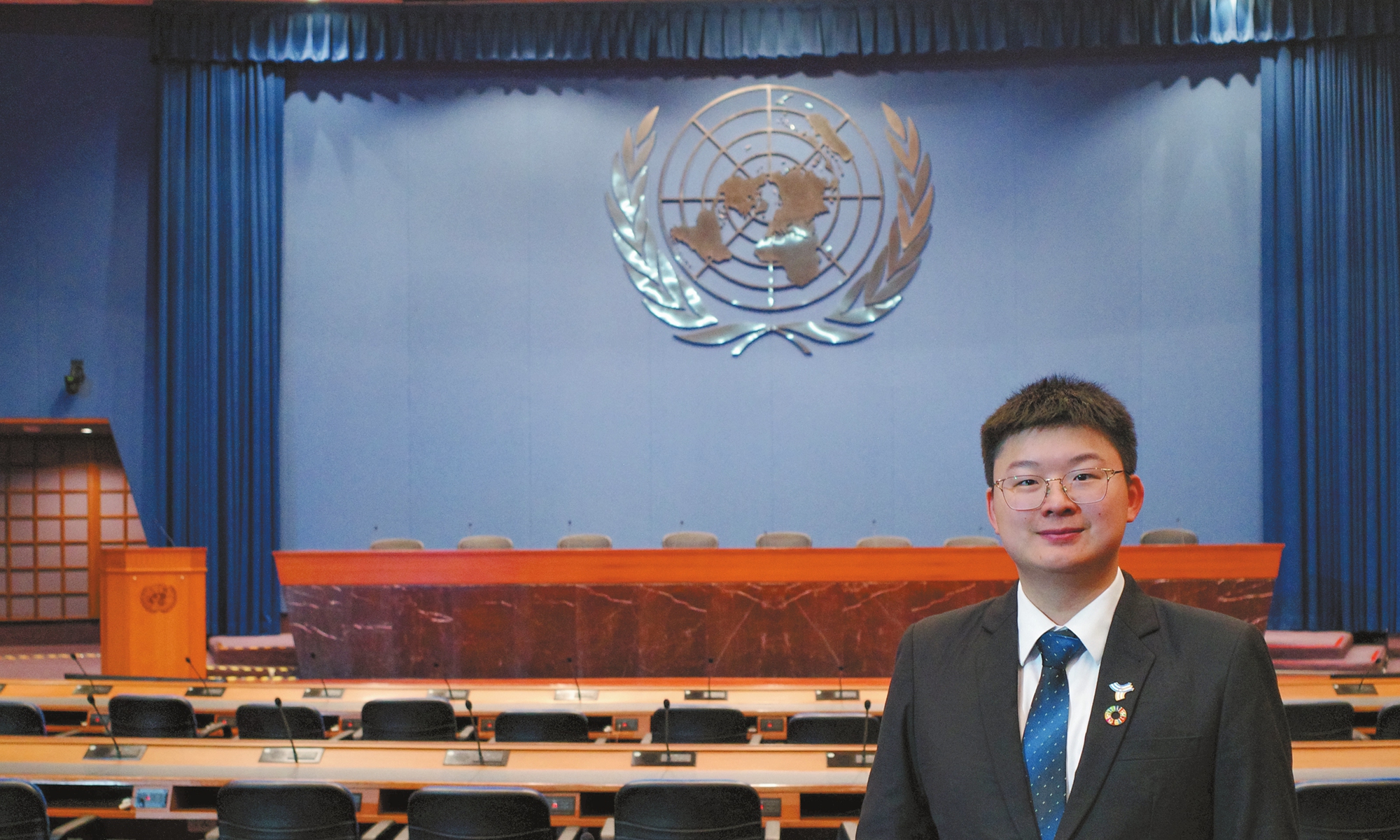
Later, Xiao Q worked with the United Nations Population Fund. Equipped with experience in the UN system and a background in international law, he began producing videos on social media in 2022, aiming to explain the UN and China's participation in global governance in a more accessible and engaging way. His efforts have since attracted millions of subscribers and hundreds of millions of views on Bilibili and other streaming platforms.
"More than half of my viewers are aged between 15 and 24. I believe young Chinese people are drawn to the UN because they yearn for a fairer and more equitable international order," Xiao Q said. "As China plays an increasingly important role on the global stage, our generation hopes to contribute our wisdom and strength to building a community with a shared future for mankind."
During his interactions with various UN agencies, Xiao Q was pleasantly surprised to learn that an increasing number of young Chinese people are submitting their resumes to the UN, hoping to take part in enhancing the global governance system. Some of his viewers have even shared that they received job or internship offers from UN bodies.
"For decades, China has contributed to global governance. Today, through the vision of building a community with a shared future for mankind, as well as concrete initiatives such as the Global Development Initiative, the Global Security Initiative, and the Global Civilization Initiative, China is offering its own solutions to advance global governance," Xiao Q said. "In the future, rooted in Chinese culture and engaged with the world, young Chinese people will confidently, cooperatively, and practically work toward building a better world."
The youth are the vanguards of our time, showcasing boundless energy and vibrant personalities.
Gen Zers not only represent the makers of the future but also serve as agents of change in the present. With an open mindset and an international outlook, they actively integrate into the currents of globalization, engaging in deep exchanges, and collaborating with youth from around the world to explore pathways and strategies to address global challenges.
The Global Times has launched the "Voice from Gen Z" series, which focuses on the proactive actions and innovative achievements of young people in areas such as global governance, cultural exchange, environmental protection, and technological innovation. Through this series, we aim to showcase the unique charm and future leadership of global Gen Zers.

Peng Jingxuan walks on the red carpet at the Cannes Film Festival on May 16, 2024. Photo: Courtesy of Peng
May 4, 2025 marked China's Youth Day, commemorating the historic May Fourth Movement of 1919, a monumental youth movement that ignited profound social changes in China. As the movement commemorates its 106th anniversary, a look back at that pivotal awakening reveals a heartening truth: Today's Chinese youth are redefining the spirit of their forebears with fresh vigor and global relevance.
Amid profound shifts in the world order and the restructuring of global governance, China's new generation is scripting a modern narrative of the May Fourth spirit - armed with cultural confidence, professional excellence, and an international vision. Some don traditional Chinese attire, bringing Eastern melodies to global stages; others dedicate themselves to international agricultural projects, leveraging cross-cultural communication skills and local expertise to adapt China's development experience for Africa's fertile soil. Still others step from UN podiums into the public limelight, using their cameras to document China's engagement with the world.
These young pioneers embody the spirit of China's new generation - a living testament to the country's wisdom and sense of responsibility. Through them, the world sees a China that is credible, endearing, and worthy of respect.
Bridging worlds with Chinese culture
At the 77th Cannes Film Festival in France, a Chinese young woman dressed in Hanfu, the traditional Chinese clothing, and carrying a guzheng - a plucked-string musical instrument with a 2,500-year history - drew rapt attention. With poised grace, Peng Jingxuan, a Gen Zer Chinese student in France, performed "Mulan," a piece inspired by the legendary female warrior, as applause rippled around her. The music wove together the heroic spirit of a heroine and the tender longing of a wanderer, flowing through her nimble fingers into the hearts of onlookers.
This is not the first time Peng has turned heads globally. Known online as "Pengpeng" to her 1.03 million YouTube followers, Peng, born in Central China's Hunan Province, has used her guzheng to bridge cultures - from bustling street corners to prestigious international art festivals. Every seven to ten days, she carries her instrument to the streets of France, dressing in Hanfu, alternating between playing classic Chinese pieces like "Evening Song of a Drunken Fisherman" and "High Mountains and Flowing Water," and guzheng-adapted versions of Western songs such as "See You Again" and "Rolling in the Deep." This musical blend - familiar yet novel - resonates deeply with passersby on French streets, often drawing applause and curiosity-fueled conversations.
"Every street show is a 'Chinese cultural showcase' to me," Peng told the Global Times. She retains the core melody of her pieces but infuses guzheng-specific techniques like string-bending and rapid finger-rocking. Passersby often stop to ask about her instrument, sparking conversations about China - moments she treasures as cultural exchanges.
To deepen these interactions, Peng now carries a small sign with English and French explanations of the guzheng, along with panda-themed souvenirs, to share China's heritage more vividly. These encounters have strengthened her mission: "Connecting the world through Chinese culture." Over the past seven years, she has brought her guzheng to more than a dozen international cities, from Paris to Milan, weaving Chinese narratives into every note.
"After my performance at the Cannes Film Festival, journalists and the renowned pianist Lang Lang told me that my piece was 'wonderful,'" Peng recalled to the Global Times. "It felt incredible because music truly transcends language. It touches people's souls."
For her, while music knows no borders, musicians carry cultural DNA. She experiments with blending guzheng into foreign pop, rock, and electronic music, but insists, "No matter the melody, the rhythm, phrasing, and emotions rooted in my culture are my signature as a Chinese musician."
Looking ahead, Peng dreams of taking her guzheng to more Belt and Road Initiative (BRI) partner countries. "I want to use Chinese music as a universal language, so the world can better understand China - one string at a time."
Nurturing professionals combating poverty
At the headquarters of the International Fund for Agricultural Development (IFAD) in Rome, Italy, Chen Zeyu, a young Chinese professional, works intensively with his team to finalize the design of the "DeSIRA+" agricultural research project. This project is dedicated to protecting indigenous crop varieties and enhancing the resilience of food security in African countries. As the only member of the team familiar with the development paths of both China and Africa, this young man from Shenzhen, South China's Guangdong Province, is serving as a bridge for dialogue among diverse civilizations and development experiences.
Chen's connection with Africa began three years ago. In 2022, Chen was granted the qualification for a government-sponsored study abroad program and went to the School of Oriental and African Studies at the University of London for further education. There, he started to consider how his research could help the millions of people in sub-Saharan Africa who are facing extreme hunger.
"I needed to translate research into tangible solutions," he told the Global Times.
His breakthrough came during a 2023 internship at the Paris headquarters of the Organisation for Economic Co-operation and Development (OECD), where the interactive map of food security in West Africa, which he led the development of, has become a decision-making reference for the agricultural departments of many countries. Later, he interned and worked at international platforms such as the United Nations Development Programme (UNDP) and the IFAD, exploring how Chinese experiences could be deeply integrated with the realities in Africa.

Chen Zeyu takes part in an event at the IFAD headquarters in Rome, Italy on February 13, 2025. Photo: Courtesy of Chen
During these field experiences, Chen keenly observed a fundamental divergence in development philosophies: While Western aid programs often prioritize policy capacity-building, China's approach emphasizes practical, measurable outcomes.
"China's technical assistance focuses on concrete metrics - like boosting crop yields - and rigorously evaluating what works," Chen explained. "It's not about handing out fish, but teaching how to fish sustainably."
At the IFAD, he introduced the experience of cultural heritage protection in Chinese agriculture into the project design, helping African farmers leverage traditional knowledge to protect indigenous crops while balancing high-yield varieties with biodiversity - an approach that earned praise from both project advisers and African government delegates.
"Now, at the IFAD, more and more colleagues from different departments like to visit the office of the China-IFAD South-South and Triangular Cooperation Facility to learn about various details of the 'Chinese solutions,'" said Chen.
When talking about the role played by the Chinese youth in international organizations, Chen's eyes lit up: "We are not just onlookers." In his opinion, an advantage of his generation is that they understand both the realities of China and international rules.
"My foreign colleagues said that each year, the new Chinese youths who arrive there bring with them new surprises," said this young man who is about to pursue a PhD in political science at Tsinghua University. He also plans to conduct on-site research in Africa.
"I want to see with my own eyes what the Chinese sorghum seeds look like when they grow in the fields of Africa," Chen said.
Building a better world
When people think of the UN, many envision sharply dressed diplomats at the organization's New York headquarters. But for Xiao Q (pseudonym), a Gen-Z Chinese man, his first two years working in the UN system involved neither suits nor skyscrapers. Instead, his office was often out in the fields.
The Centre for Sustainable Agricultural Mechanization under the UN, formerly known as the UN Asian and Pacific Centre for Agricultural Engineering and Machinery, was the first official UN body headquartered in China. After graduating from university in 2018, Xiao Q began his journey at this center, where he was primarily responsible for developing agricultural machinery testing standards across the Asia-Pacific region.
"Tractors, harvesters, seeders - I spent most of my time in the fields working with different types of agricultural machinery. It gave me a whole new perspective on the UN," Xiao Q said.
While at the center, he also helped organize a series of agriculture-focused training programs for countries across Asia, which gave him a firsthand understanding of China's role and unique contributions to global development.

Xiao Q attends a conference at the UN Economic and Social Commission for Asia and the Pacific. Photo: Courtesy of Xiao Q
Later, Xiao Q worked with the United Nations Population Fund. Equipped with experience in the UN system and a background in international law, he began producing videos on social media in 2022, aiming to explain the UN and China's participation in global governance in a more accessible and engaging way. His efforts have since attracted millions of subscribers and hundreds of millions of views on Bilibili and other streaming platforms.
"More than half of my viewers are aged between 15 and 24. I believe young Chinese people are drawn to the UN because they yearn for a fairer and more equitable international order," Xiao Q said. "As China plays an increasingly important role on the global stage, our generation hopes to contribute our wisdom and strength to building a community with a shared future for mankind."
During his interactions with various UN agencies, Xiao Q was pleasantly surprised to learn that an increasing number of young Chinese people are submitting their resumes to the UN, hoping to take part in enhancing the global governance system. Some of his viewers have even shared that they received job or internship offers from UN bodies.
"For decades, China has contributed to global governance. Today, through the vision of building a community with a shared future for mankind, as well as concrete initiatives such as the Global Development Initiative, the Global Security Initiative, and the Global Civilization Initiative, China is offering its own solutions to advance global governance," Xiao Q said. "In the future, rooted in Chinese culture and engaged with the world, young Chinese people will confidently, cooperatively, and practically work toward building a better world."
